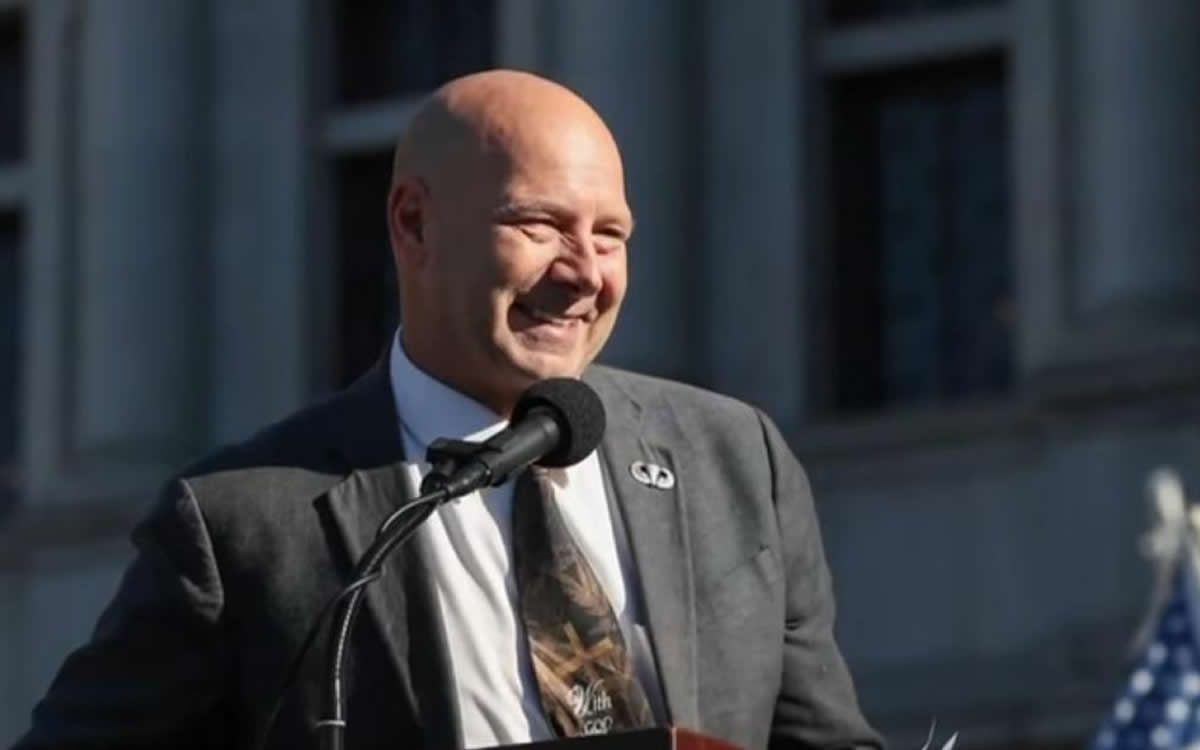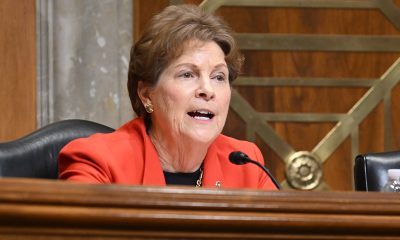Politics
Republican Pa. governor nominee opposes LGBTQ rights
Former President Trump backed state Sen. Doug Mastriano

Republican leadership in the Keystone State are expressing quiet alarm over the emergence of radical-right state senator who secured his place as the party’s nominee in the race against Democratic nominee for governor, Josh Shapiro, who is himself currently serving as the commonwealth’s attorney general.
State Sen. Doug Mastriano, who represents Cumberland, Adams, Franklin and York Counties in the South Central Pennsylvania area bordering Maryland, was not seen as a truly viable candidate in the primary race to be the party standard-bearer until he was endorsed by former President Trump.
Pennsylvania’s gubernatorial race has serious implications for the outcome of the 2024 presidential election cycle as well. The commonwealth is a strategic swing state and the occupant of the governor’s chair in Harrisburg will lend considerable influence to a final vote count.
Mastriano is a polarizing figure within the state’s Republican Party.
The retired U.S. Army colonel has campaigned at political events that included QAnon adherents, he espoused a political agenda that embraced Trump’s Big Lie about the 2020 election, rejected measures taken to protect Pennsylvanians including masks in the coronavirus pandemic, holding an anti-vaccine “Medical Freedom Rally” rally on the state Capitol steps days after declaring his candidacy for the GOP governor’s primary race, and also mixing in messaging of Christian nationalism.
He also supports expanding gun rights in Pennsylvania and in the state Senate sponsored a bill to ban abortion once a heartbeat is detected.
NBC News noted that Mastriano pledged in his election night address that on the first day of his administration he would crack down on “critical race theory,” a catchall term Republicans have used to target school equity programs and new ways of teaching about race, transgender rights and any remaining COVID-19 vaccine requirements.
“CRT is over,” Mastriano declared. “Only biological females can play on biological females’ teams,” he added, and “you can only use the bathroom that your biology and anatomy says.”
His anti-LGBTQ views have long been part of his personal portfolio. The Washington Post reported that 21 years ago while attending the Air Force’s Air Command and Staff College in 2001, then-Maj. Mastriano wrote his master’s thesis on a hypothetical “left-wing ‘Hitlerian putsch'” that was caused by “the depredations of the country’s morally debauched civilian leaders.” Among those “depredations,” in his words, was the “insertion of homosexuality into the military.”
As the Post reported, his paper shows “disgust for anyone who doesn’t hold his view that homosexuality is a form of ‘aberrant sexual conduct.'”
The paper is posted on an official Defense Department website and lists Mastriano as the author at a time when he said he received a master’s degree from the school.
Two decades before he was Republican nominee for Pennsylvania governor, Doug Mastriano warned in a master’s thesis that morally debauched political leaders weren’t fit to oversee the U.S. military. https://t.co/NHOnijBng7
— The Washington Post (@washingtonpost) May 20, 2022
This is not the only instance of Mastriano professing anti-LGBTQ beliefs.
In 2018, he stated his belief that LGBTQ couples should not be allowed to adopt a child. During an interview with 103.7 FM, when asked “should LGBTQ couples, i.e. two moms or two dads, be allowed to adopt?” Mastriano answered, “No.” [This takes place at the 16:00 mark.]
NBC News interviewed David La Torre, a Republican and former adviser to fellow gubernatorial candidate Jake Corman.
“As far as what a Pennsylvania government would look like with Mastriano in charge, quite frankly, it’s just not something I’m ready to think about at this point,” La Torre said, adding that while there are many unknowns, the dynamic between Mastriano and the state General Assembly, currently controlled by Republicans, would be one to watch.
“All I know is this — he will govern as governor like he campaigned,” he said. “He would govern with a sledgehammer and expect Republicans to fall in line. And it would be one of the more fascinating tugs of war we’ve seen in Harrisburg.”
Dave Ball, chairman of the Washington County GOP, told NBC News that Mastriano’s victory was “a shame” for the party, the product of “a phenomenon that I truly don’t understand.” But any misgivings won’t stop Ball from working toward the ultimate goal: taking back the governor’s mansion, saying it’s a must-win race. (The two-term incumbent, Tom Wolf, a Democrat, is term-limited.)
As if telegraphing the battles to come should he take the governor’s chair, Politico reported: “Our biggest problem,” said Mastriano on Steve Bannon’s “War Room: Pandemic” podcast on Tuesday, “is going to be these feckless RINO-type Republicans here that will not allow us to have a fighter as governor. But we’re going to beat them and they’re going to lose power, and they’re going to be put to shame.”
Mastriano lists agenda as governor during Pa. GOP nominee victory speech:
Congress
Congress passes ‘Big, Beautiful Bill’ with massive cuts to health insurance coverage
Roughly 1.8 million LGBTQ Americans rely on Medicaid

The “Big, Beautiful Bill” heads to President Donald Trump’s desk following the vote by the Republican majority in the U.S. House of Representatives Thursday, which saw two nays from GOP members and unified opposition from the entire Democratic caucus.
To partially offset the cost of tax breaks that disproportionately favor the wealthy, the bill contains massive cuts to Medicaid and social safety net programs like food assistance for the poor while adding a projected $3.3 billion to the deficit.
Policy wise, the signature legislation of Trump’s second term rolls back clean energy tax credits passed under the Biden-Harris administration while beefing up funding for defense and border security.
Roughly 13 percent of LGBTQ adults in the U.S., about 1.8 million people, rely on Medicaid as their primary health insurer, compared to seven percent of non-LGBTQ adults, according to the UCLA School of Law’s Williams Institute think tank on sexual orientation and gender identities.
In total, the Congressional Budget Office estimates the cuts will cause more than 10 million Americans to lose their coverage under Medicaid and anywhere from three to five million to lose their care under Affordable Care Act marketplace plans.
A number of Republicans in the House and Senate opposed the bill reasoning that they might face political consequences for taking away access to healthcare for, particularly, low-income Americans who rely on Medicaid. Poorer voters flocked to Trump in last year’s presidential election, exit polls show.
A provision that would have blocked the use of federal funds to reimburse medical care for transgender youth was blocked by the Senate Parliamentarian and ultimately struck from the legislation — reportedly after the first trans member of Congress, U.S. Rep. Sarah McBride (D-Del.) and the first lesbian U.S. senator, Tammy Baldwin (D-Wis.), shored up unified opposition to the proposal among Congressional Democrats.
Congress
Ritchie Torres says he is unlikely to run for NY governor
One poll showed gay Democratic congressman nearly tied with Kathy Hochul

Gay Democratic Congressman Ritchie Torres of New York is unlikely to challenge New York Gov. Kathy Hochul (D) in the state’s next gubernatorial race, he said during an appearance Wednesday on MSNBC’s “Morning Joe.”
“I’m unlikely to run for governor,” he said. ““I feel like the assault that we’ve seen on the social safety net in the Bronx is so unprecedented. It’s so overwhelming that I’m going to keep my focus on Washington, D.C.”
Torres and Hochul were nearly tied in a poll this spring of likely Democratic voters in New York City, fueling speculation that the congressman might run. A Siena College poll, however, found Hochul leading with a wider margin.
Back in D.C., the congressman and his colleagues are unified in their opposition to President Donald Trump’s signature legislation, the “Big Beautiful Bill,” which heads back to the House after passing the Senate by one vote this week.
To pay for tax cuts that disproportionately advantage the ultra-wealthy and large corporations, the president and Congressional Republicans have proposed massive cuts to Medicaid and other social programs.
A provision in the Senate version of the bill that would have blocked the use of federal funds to reimburse medical care for transgender youth was blocked by the Senate Parliamentarian and ultimately struck from the legislation, reportedly after pressure from transgender U.S. Rep. Sarah McBride (D-Del.) and lesbian U.S. Sen. Tammy Baldwin (D-Wis.).
Torres on “Morning Joe” said, “The so-called Big Beautiful Bill represents a betrayal of the working people of America and nowhere more so than in the Bronx,” adding, “It’s going to destabilize every health care provider, every hospital.”
Congress
House Democrats oppose Bessent’s removal of SOGI from discrimination complaint forms
Congressional Equality Caucus sharply criticized move

A letter issued last week by a group of House Democrats objects to Treasury Secretary Scott Bessent’s removal of sexual orientation and gender identity as bases for sex discrimination complaints in several Equal Employment Opportunity forms.
Bessent, who is gay, is the highest ranking openly LGBTQ official in American history and the second out Cabinet member next to Pete Buttigieg, who served as transportation secretary during the Biden-Harris administration.
The signatories to the letter include a few out members of Congress, Congressional Equality Caucus chair and co-chairs Mark Takano (Calif.), Ritchie Torres (N.Y.), and Becca Balint (Vt.), along with U.S. Reps. Nikema Williams (Ga.), Hank Johnson (Ga.), Raja Krishnamoorthi (Ill.), Delia Ramirez (Ill.), Joyce Beatty (Ohio), Lloyd Doggett (Texas), Eleanor Holmes Norton (D.C.), Josh Gottheimer (N.J.), and Sylvia Garcia (D-Texas).
The letter explains the “critical role” played by the EEO given the strictures and limits on how federal employees can find recourse for unlawful workplace discrimination — namely, without the ability to file complaints directly with the Employment Opportunity Commission or otherwise engage with the agency unless the complainant “appeal[s] an agency’s decision following the agency’s investigation or request[s] a hearing before an administrative judge.”
“Your attempt to remove ‘gender identity’ and ‘sexual orientation’ as bases for sex discrimination complaints in numerous Equal Employment Opportunity (EEO) forms will create unnecessary hurdles to employees filing EEO complaints and undermine enforcement of federal employee’s nondiscrimination protections,” the members wrote in their letter.
They further explain the legal basis behind LGBTQ inclusive nondiscrimination protections for federal employees in the EEOC’s decisions in Macy v. Holder (2012) and Baldwin v. Foxx (2015) and the U.S. Supreme Court’s decision in Bostock v. Clayton County (2020).
“It appears that these changes may be an attempt by the department to dissuade employees from reporting gender identity and sexual orientation discrimination,” the lawmakers wrote. “Without forms clearly enumerating gender identity and sexual orientation as forms of sex discrimination, the average employee who experiences these forms of discrimination may see these forms and not realize that the discrimination they experienced was unlawful and something that they can report and seek recourse for.”
“A more alarming view would be that the department no longer plans to fulfill its legal obligations to investigate complaints of gender identity and sexual orientation and ensure its
employees are working in an environment free from these forms of discrimination,” they added.
-

 U.S. Supreme Court2 days ago
U.S. Supreme Court2 days agoSupreme Court to consider bans on trans athletes in school sports
-

 Out & About2 days ago
Out & About2 days agoCelebrate the Fourth of July the gay way!
-

 Maryland5 days ago
Maryland5 days agoSilver Spring holds annual Pride In The Plaza
-

 Opinions5 days ago
Opinions5 days agoSupreme Court decision on opt outs for LGBTQ books in classrooms will likely accelerate censorship












